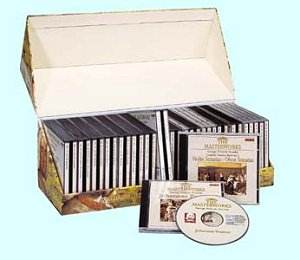Handel
wrote 'Solomon' after a group of martial oratorios to texts by
the Revd. Thomas Morrell. Morrell's libretti all helped Handel
to mine the national mood in the wake of the 1745 Jacobite uprising
and Cumberland's subsequent victory. But Morrell's rather broad-brush
libretti restricted the scope of Handel's writing. For his next
pair of oratorios ('Solomon' and 'Susanna') Handel turned to another,
anonymous librettist. It is one of the curiosities of Handel's
life that despite the not inconsiderable documentation for some
areas of his career, there are glaring lacunae such as this.
The
librettist for 'Solomon' may have been Newburgh Hamilton who did
the necessary alterations to the original texts on which were
based 'Alexander's Feast' and 'Semele'. The libretti for 'Solomon'
and 'Susanna' have much in common, particularly their use of descriptions
of Nature and the Natural world. Handel was quite susceptible
to such sentiments and produced some highly evocative music in
both the works. Morell's libretti tended to be rather full of
pious platitudes and abstract ideas. So it is not surprising that
given the libretto to 'Solomon', Handel gives us a wonderfully
rich piece with double choruses and a remarkably large orchestra
(Strings, flutes, oboes, bassoons, horns, trumpets and timpani).
Though he uses his orchestra with remarkable restraint, the trumpets
and drums not performing until the opening of Act II.
'Solomon'
is based on II Chronicles and I Kings together with a few hints
from Josephus's Antiquities of the Jews and is essentially an
undramatic piece. In Act I, Solomon and Zadok, the High Priest
celebrate the completion of the Temple. Solomon goes on to consummate
his marriage with Pharaoh's daughter. This later section is remarkable
for the explicitness with which it hymns the joys of the marriage
bed (Something that may have led Handel to drop this act entirely
when he revived the piece later on in his career). Act II deals
with the story of Solomon's judgement of the case of the two harlots,
each one laying claim to a baby. This is the only dramatic section
in the oratorio. Act III starts with the famous Arrival of the
Queen of Sheba and the remainder of the act details her visit
and Solomon's entertainment for her. 'Solomon' may have had an
underlying narrative in glorifying the Augustan Age of George
II, but given that we have little basic knowledge about the genesis
of the oratorio, such ideas must remain suppositions. What the
piece does do though, is give us a picture of a golden age, picturing
its religion, the bliss of happy marriage, justice, noble buildings
and lovely countryside along with the envy of neighbouring states.
The
previous volume in this series, 'Judas Maccabaeus', was also recorded
by the Amor Artis Chorale and the English Chamber Orchestra under
Johannes Somary. In that volume the performance of the Amor Artis
Chorale was disappointing but they did rise to the challenge of
the martial nature of that work. In 'Solomon' their robust vibrato
laden tones are generally unsuitable for Handel's sophisticated
choral writing. The opaque sound of their singing is unsatisfactory
in such pieces as the Nightingale chorus.
As
with 'Judas Maccabaeus' the soloists provide some consolation.
Sheila Armstrong is by turns ravishing, appealing and charming
as the three heroines (Pharaoh's daughter, the first Harlot and
the Queen of Sheba). Her scenes with Felicity Palmer's vehement
second Harlot are dramatically memorable. Unfortunately these
scenes, as with much else in the set, are marred by the Solomon
of Justino Diaz.
Handel
almost certainly viewed Solomon principally as a lover, after
all there is no martial element in the opera. And in the oratorios,
as in the operas, lovers were almost certainly high voices. It
is unlikely that he was constrained by available personnel, after
all if he had wanted Solomon to be a low voice then he could simply
have allocated the alto to one of the priestly roles, something
he did in other oratorios. Solomon was originally sung by a female
contralto, but on recent recordings the role has most successfully
been sung by both female and male altos. Unfortunately, on this
recording the role is sung by a bass. Diaz has a very dark voice,
which renders Solomon even less youthful than would have been
the case with a lighter voiced baritone. His English is admirable
but, coupled with the illogical tessitura, the slight accent unfortunately
becomes just another thing to get annoyed about. Singing solo
he makes a decent stylist, it is just a pity that he was not singing
a real bass part. But in the ensembles the octave transposition
falsifies the relationships between the voices and violates the
delicate balance of Handel's orchestration.
As
Zadok, Robert Tear is in bright, fearless form. In the passage
work, I think he was probably attempting to give the notes a little
more weight, commensurate with the nature of the general performance.
Unfortunately this misguided attempt results in passage work that
too often sounds like a car starting. This is a shame as Tear
is a fine performer and this mars what could have been a good
performance. As a Levite Michael Rippon performs decently, but
occasionally sounds uncomfortable.
The
English Chamber Orchestra turn in another stylish performance.
A little heavy by today's standards, but the orchestral contribution
remains one of the most listenable parts of this recording. Somary's
speeds remain on the steady side without ever getting too heavy.
Robert
Hugill
